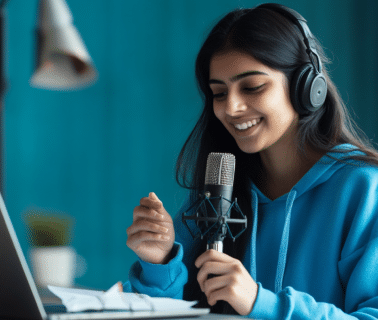Listen to this blog
The radio broadcasting industry in India is undergoing rapid changes, with podcasts playing a crucial role in this shift by providing enhanced interaction and ease of access. Podcasts are an excellent resource for journalism and media students, providing learning opportunities and professional growth. In this discussion, we will explore the upcoming developments in radio broadcasting and provide targeted suggestions for podcasts that might be highly advantageous for journalism and media students.
The Evolution of Radio Broadcasting in India
Traditional radio is being enhanced by digital channels, enabling listeners to access content whenever they want. This change facilitates the inclusion of a wider array of material, encompassing not only news and current affairs but also more specialized and specific subjects. Podcasts can tailor their material to various regional languages and cultures, thereby offering localized content that connects more profoundly with diverse audiences throughout India. Radio transmission increasingly includes enhanced interaction through social media listener participation and immersive audio experiences. By integrating conventional radio components with podcasting, broadcasters can uphold the real-time nature of live radio while providing the convenience and comprehensiveness of podcasts.
The historical development of podcasting in India
The history of podcasts in India is an intriguing exploration that parallels the worldwide development of this medium while also showcasing distinct regional attributes and patterns of growth.
Emerging Period (2005-2010):
Podcasts started to gain popularity worldwide in 2004-2005, and India experienced its initial surge of podcasting in the mid-2000s. Nevertheless, the initial acceptance was hindered by the limited reach of the internet and the general lack of knowledge about this platform. Early adopters of podcasts in India included technology enthusiasts and developers of specialized content. The main emphasis was predominantly on technology, education, and themes of interest to hobbyists.
Growth Phase (2010-2015):
During this phase, the emergence of cost-effective smartphones and improved internet access initiated a transformation in the scenario. As internet users increased, the potential viewership for podcasts grew. During this period, there was an increase in the variety of content, with a focus on issues that were specific to regions and culturally significant. Furthermore, there was a noticeable increase in language diversity as podcasts in Hindi, Tamil, Telugu, and various other regional languages began to surface. Two of the initial noteworthy Indian podcasts are “Indicast” and “Musings of a Stand-Up Comedian” by Vir Das.
Mainstream Emergence (2015-2020):
The introduction of Reliance Jio in 2016 significantly enhanced internet availability in India, resulting in a notable rise in the consumption of digital content, such as podcasts. Podcast platforms specifically tailored for the Indian audience, such as IVM Podcasts (Indus Vox Media) and Audiometric, began to gain popularity. International platforms like Apple Podcasts and Spotify also experienced a substantial surge in their user base from India. During this time, there was a significant increase in the production of podcast content spanning several genres, such as news, storytelling, business, and entertainment. Podcasts such as “Maed in India” (focused on music), “The Seen and the Unseen” (centered on public policy), and “Cyrus Says” (combining comedy and discourse) gained significant popularity. The popularity of podcasting was further propelled by the entry of influencers and celebrities into the medium. For instance, Bollywood celebrities like Anupam Kher have started their podcasts.
In the current scenario (2020-Present), the COVID-19 pandemic has greatly contributed to the increased popularity of podcasts as individuals have looked for alternative sources of entertainment and information while adhering to stay-at-home measures. Spotify has emerged as a major player in India because of its ambitious expansion efforts, substantial investments, unique content, and strategic partnerships. Platforms such as Google Podcasts, Amazon Music, and Gaana are all essential components of the ecosystem. There is an ongoing inclination towards varied and superior content. Investigative journalism, narrative storytelling, mental health, and regional language podcasts are experiencing significant growth. Programs such as “Puliyabaazi” (focused on public policy in Hindi), “The Indian Noir” (centered around crime fiction), and “Shunya One” (covering tech and entrepreneurship) exemplify this pattern. Podcasts are becoming more commonly utilized for educational purposes, as colleges and academic institutions are taking advantage of this medium to deliver lectures, courses, and instructional content.
Effects on Journalism
Podcasts have become a potent platform for narrative and investigative journalism. Journalists are permitted to investigate stories more extensively than traditional media outlets. Podcasts such as “The Sandip Roy Show” and “NL Hafta” produced by Newslaundry have emerged as mediums for conducting investigative journalism and providing comprehensive news analysis. Podcasts offer a more intimate and captivating means of connecting with viewers, cultivating a sense of closeness and confidence that is often more challenging to establish through other media types.
Outlook of Podcasting
The Indian podcast market is projected to sustain its accelerated expansion, propelled by rising internet penetration, greater familiarity with the format, and the emergence of new creators and venues. The progress in AI, machine learning, and voice recognition is expected to profoundly transform podcast creation and consumption. The increasing number of viewers allows producers to generate revenue through advertisements, subscriptions, and exclusive content agreements, resulting in an autonomous environment.
Overall, the development of podcasts in India can be characterized by an initial sluggishness, followed by a swift expansion and broadening, which was greatly shaped by technological progress and shifts in how people consume material. Journalism and media students must comprehend this transformation to effectively utilize podcasts as a dynamic platform for storytelling and engaging with the audience.
Advantages for students studying Journalism and Mass Communication
Podcasts frequently showcase seasoned journalists and media experts engaging in conversations about their work, difficulties, and valuable perspectives on the industry. Students get the opportunity to explore a diverse array of perspectives and journalistic approaches, thereby expanding their comprehension of both global and local matters. Creating their podcasts can facilitate acquiring skills in audio production, narrative construction, and digital advertising for students. Several podcasts feature interviews with prominent figures in the field, offering networking opportunities and access to potential mentors.
Conclusion
The emergence of podcasts in India’s radio broadcasting industry represents a new phase that provides journalism and media students with abundant opportunities for learning and development. Students can acquire vital industry insights through active participation in these platforms, cultivate essential competencies, and equip themselves for prosperous careers in the ever-changing media environment. Over the past several years, the podcast business in India has undergone substantial growth and transformation, solidifying its position as a lively and dynamic platform for consuming content.
India’s podcast sector is set to grow further, fueled by a youthful and technologically adept populace and a growing desire for a wide range of audio content that can be accessed on demand. By making smart investments in content quality, monetization techniques, and technical improvements, the industry may overcome current obstacles and fully realize its potential. With increasing numbers of content creators and consumers embracing podcasting, India is poised to emerge as a prominent participant in the global podcasting industry.
Prepare for your next career milestone with us












